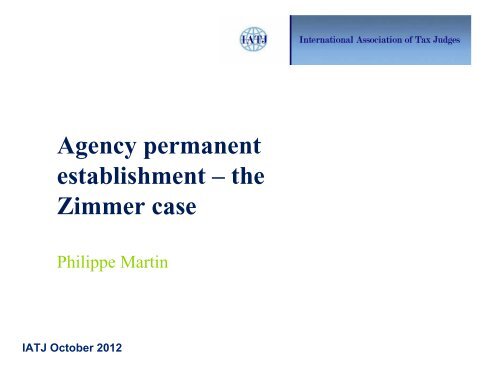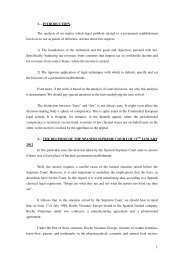Agency Permanent Establishment - Zimmer case - Iatj.net
Agency Permanent Establishment - Zimmer case - Iatj.net
Agency Permanent Establishment - Zimmer case - Iatj.net
Create successful ePaper yourself
Turn your PDF publications into a flip-book with our unique Google optimized e-Paper software.
<strong>Agency</strong> permanentestablishment – the<strong>Zimmer</strong> <strong>case</strong>Philippe MartinIATJ October 2012
Facts• Before 1995, <strong>Zimmer</strong> SAS (France) acts as a distributor in France for productsmade by <strong>Zimmer</strong> Ltd (UK), a related company• In 1995, <strong>Zimmer</strong> SAS becomes a commissionnaire for <strong>Zimmer</strong> Ltd (signscommission contract with <strong>Zimmer</strong> Ltd, sells facilities and stock of products to<strong>Zimmer</strong> Ltd)• Under the commission contract:• <strong>Zimmer</strong> SAS is charged with the sale in France of the products of <strong>Zimmer</strong> Ltd in itsown name (not in the name of <strong>Zimmer</strong> Ltd), but for the account of and at the risk of<strong>Zimmer</strong> Ltd• <strong>Zimmer</strong> SAS may accept orders, display quotes and documents in tender offers,negotiate prices, grant discounts or terms of payment with current or new customersand conclude sales contracts on behalf of <strong>Zimmer</strong> Ltd without its prior approval• French tax administration: <strong>Zimmer</strong> Ltd has a PE in France under the dependentagent provision of France-UK treaty (signed in 1968)
Outcome• Conseil d’Etat (31 March 2010) quashes decision made byAdministrative Court of Appeals of Paris and decides there is noagency PE• Conseil d’Etat:Under the France-UK treaty (equivalent to Art. 5(5) and 5(6)OECD and identical to 1963 OECD Model), « a company residentin France which is controlled by a company resident in the UKcan only constitute a PE of the latter if it cannot be considered asan independent agent of the company resident in the UK and if ithabitually exercises in France authority permitting it to bind thatcompany in a commercial relationship with respect to theoperations which constitute that company’s own activities »
OutcomeAccording to the terms of Art. L 132–1 of the French Commercial Code:“A commissionnaire is a person who acts in his own name or under a businessname for the account of a principal (“commettant”) …”“It follows from these provisions [as interpreted by French <strong>case</strong> law] thatcontracts concluded by a commissionnaire, even though they are concludedfor the account of its principal, do not bind the latter directly vis-à-vis thecounterparties of the commissionnaire.”“…unless it appears either from the express terms of the contract ofcommission, or from other factual elements relating to the arrangement, thatdespite the ‘commission’ title given by the parties to the contract betweenthem, the principal is personally bound by the contracts concluded with thirdparties by his commissionnaire who must, therefore, for this reason, beregarded as his representative and constitute a permanent establishment.”
Issue: combination of 5(5) and 5(6)• In the French text, Art. 5(6) excludes « commissionnaires ». Isthe debate closed?‒ No: Although the examples of 5(6) may seem unnecessary forcommissionnaires (because of 5(5), the general rule of 5(6)excludes independent agents‒ Therefore the real test, for dependent persons, is the authority toconclude contracts in the name of an enterprise (5(5)‒ In the <strong>Zimmer</strong> <strong>case</strong>, the dependent character of <strong>Zimmer</strong> SAS wasnot even in dispute. The Conseil d’Etat applies the test in 5(5)
Issue: Literal and juridical interpretation of 5(5) ?• Conseil d’Etat: « in the name of » means legally binding• In 5(5) the distinction between « pour le compte de » / « on behalf of » and« au nom de » / « in the name of » seems to be borrowed from French legalconcepts, which may be explained by the history of the drafting of the OECDModel• Opinion of Rapporteur public:- 1963 OECD Commentaries confirm that view- § 32.1 of later OECD Commentaries do not affect the outcome (laterCommentaries + designed to solve specific problem in the UK)- Purpose of PE rule: tax the non-resident company in the source countryfor its own activity in this country
Issue: Why not a factual, economic approach ?• There is tax planning going on: should courts step in and interpret 5(5) to prevent taxschemes ?• Legally, does a « economically binding » test make sense ?• Difficult to find a manageable economic test that would not create great legaluncertainty- commissionnaire automatically triggers economic activity by principal? But whatof other distribution arrangements ?- commissionnaire has no risk because no stock? But in some situations otherdistributors may not run many risks.- in the <strong>Zimmer</strong> <strong>case</strong>, the practical elements put forward by the French taxadministration were not uncommon for a commissionnaire• Do not mix the issue of the existence of a PE and the issue of transfer pricing
Issue: Potential recharacterization• <strong>Zimmer</strong> decision mentions a potential recharacterization of a commissionnaireagreement as binding the principal, deriving from the express terms of thecontract of commission, or from other factual elements relating to thearrangement• Not necessarily abuse of law• Back to usual civil law interpretation methods:• The title of a contract may be disregarded if the actual provisions do not match• A contract may be interpreted using surrounding agreements that clarify its meaning• The actual behavior of the parties can reveal the true nature of a contract• The test remains: is the principal legally bound vis-à-vis the customers ?





